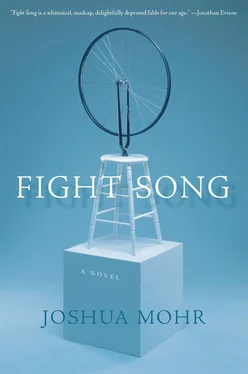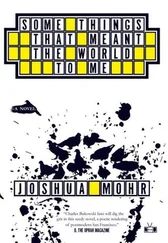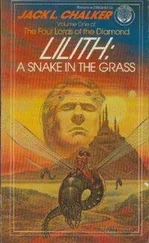“In the right hands, sodomy can be beautiful.”
“That’s not really what we’re talking about,” Bob says.
“I have made a breakthrough,” says Schumann, still wearing his football uniform, although thank god for small miracles, he’s not wearing the helmet.
“Breakthrough with what?”
“I know what my gladiator identity was missing. I needed to stop using my white man name.”
“You are white.”
“I was. Or maybe I am normally, but not right now. Not while I’m wearing the cloth of my tribe. I’m a Native American warrior.”
“I don’t think so,” Coffen says.
“From this moment on, I’ll only answer to the name Reasons with His Fists.”
“I refuse to call you that.”
It looks like Schumann might start arguing with Coffen, but Björn makes these really angry mumbling noises.
“How did you even do this to him?” Bob asks.
“That show you saw last night. He did the same one tonight. So I waited outside and then snuck up and cold-cocked him and tied him up and taped his mouth and here we are.”
“He’s going to kill us.”
“We scored a touchdown.”
Coffen, once worried about being a weekend dad, now is crippled by fear that he’ll be a prison dad, rotting away in a cell, scribbling letters that his children never respond to. They’ll certainly never visit him. Prison dad doesn’t spend holidays surrounded by loved ones. He spends them slow-dancing with his cell mate, resting his head on a muscled, tattooed shoulder.
“I’ll never see Margot’s graduation,” says Bob. “Somebody else will explain the birds and the bees to Brent.”
Schumann points at Björn: “We are the winners. I beat your ass, sucka!”
“I never asked you to do this,” Bob says.
“We went for the jugular and were handsomely rewarded,” Schumann says.
“What are you talking about?”
“The killer instinct of competition.”
“That’s exactly what I’m worried about, Schumann. What if he kills us once we let him go? What if he takes back his word about not calling the cops and he tells them everything?”
“I am Reasons with His Fists,” he says, “and I fear no man.”
“You are Schumann, and you should fear that man,” Coffen says, pointing at the wiggling magician, still making angry mumbling noises.
Bob Coffen flees Schumann and goes back in Empire Wasted to figure out what to do about Björn. He decides a beer is in the cards, goes over toward the stage once he consumes it in four panicked swigs. Ace is talking with a woman, presumably his girlfriend. The boy is hugging her. She pats his back.
“Here he is,” says Ace and points at Coffen, by way of a weird introduction.
“Bob is me,” Bob says to the woman, shaking her hand, watching the other one still patting on the boy.
“I’m Kathleen. Call me Kat.”
“Very nice to meet you.”
“Told you he was all manners,” Ace says.
“Are you excited for the show tonight?” Coffen asks her.
“No matter whether me and Ace are fighting,” Kat says, “I never miss a French Kiss concert. They are incredible, and Ace loves playing music so much.”
Bob is impressed with Kat’s commitment to Ace even when they’re fighting — fighting to such an extreme that he’s sleeping at work. “You are a good woman,” Coffen says. “Sometimes people who you want to support don’t want you around them. Sometimes they say that their Norwegian coach is the only team they need.”
“What?” Kat asks.
“Let’s cool it with the moping,” Ace says to Bob. “We’re here to live a little, right?”

Soon, Tilda saunters into the bar. She sees Coffen right off because the place is pretty empty. He’s hunkered alone at the bar. Ace and the other members of the French Kiss contingent are all backstage putting makeup on one another’s faces, getting into their facsimiles of Kiss characters.
Bob has switched from beer to vanilla vodka.
And he’s well on his way to being intoxicated. If intoxication is like putting on a pair of pants, Coffen has one leg in for sure and is now working the other through.
Bob is so happy to see Tilda. Can Coffen call her a friend? He’s going to. She chose to come here and spend time with him and that’s what friends do, after all — they enjoy each other’s company. Or so Bob’s heard around the water cooler.
Tilda’s wearing a cotton tank top and tight jeans. Muscles galore. Tanned muscles making lumpy stacks on her shoulders. She could be a cage fighter. In fact, Coffen doesn’t know for sure that she isn’t a cage fighter, so the first vanilla-vodka-atrophied idea that escapes his mouth is “You ever kill a man with your bare hands?”
“Always wear gloves because these days with all the DNA technology, killing with your bare hands is like signing a confession.”
“Is that a metaphor?”
“Which part?”
“The whole thing.”
“Sure,” she says.
“I need to believe you haven’t killed a man with your bare hands.”
“Then why’d you ask the question?”
It’s here that Coffen decides to enlist this bawdy Taco Shed confidant into Schumann’s kidnapping ring. Why would he do such a thing? Why involve anyone else? Simply put: He’s telling her because he’s buzzed and feeling useless and like an outcast, a looming divorcé, a weekend dad destined to fail his kids (and that’s not even to mention the terrifying prison dad hallucination), or to be replaced by somebody new, someone like Gotthorm — a man of strong body and mind, one blessed with a severe, Nordic bone structure, one well over six feet tall who can breed a platoon of bloodthirsty Vikings. This avalanche of panic isn’t all that’s going on inside Bob. Add to this the scene he’s recently witnessed at Korean barbecue: the boy who’d been so cruel to Ace suddenly saying that Ace Frehley is a genius; the boy meeting Ace somewhere near the middle, compromising, extending an olive branch of sorts. Will that smart-ass kid do everything in his power to put Ace through the ringer during his teenage years? No doubt about it. But it was touching to see some effort from the boy tonight. Maybe that’s all anybody’s really after: effort. A stab to meet in the middle. All of this piles on Coffen’s shoulders, plus the simple fact that there is a kidnapped sorcerer outside and Bob has no idea what to do next.
And so Coffen spills the beans to Tilda: “I’m tangentially involved in criminal activity this evening.”
“Guess you’re not the prude I pegged you for.”
“You know how you used to think I was a cop?”
“I’m still on the fence.”
“Really?” Coffen says, his feelings growing even more wounded. “Why?”
She nods. “I have trust issues. And if you are a cop, we’re back standing on the fertile soil of entrapment.”
“What if I was to say that I can prove I’m not a cop right this very second beyond any reasonable doubt?”
“That sounds like something a cop would say. Are you drunk?”
“Probably,” he says, taking another swig of vanilla vodka, “and I’d like to let you in on my crime, if you’d be interested in such information.”
“I’m listening.”
“What we did was—”
“Wait, who’s ‘we’?”
“I’m talking about me and Schumann.”
She smiles mischievously. “Schumann’s here?”

He takes her out front to Schumann’s SUV, which is still parked in the same spot as before, which was where Schumann had promised to leave it while Bob went back in the bar to formulate some kind of crackpot plan to deal with Björn, though once alone it occurred to Coffen that a) Schumann probably won’t listen to his plan anyway, seeing as how he went ahead and swiped Björn on his own quarterback accord, and b) he kidnapped a master of the dark arts without any concrete idea what to do with him, simply stole him for some kind of contorted notion of victory, and c) nowhere in Schumann’s cranium does there seem to be ample fear over the very real possibility of incarceration, and d) Schumann might be mentally ill or so hardwired for competition that he’s somehow untrained for civilian life.
Читать дальше













